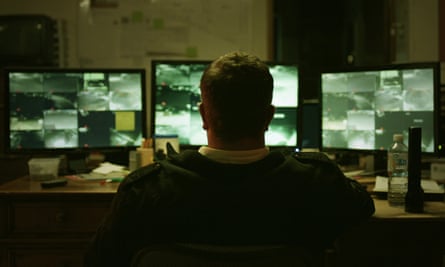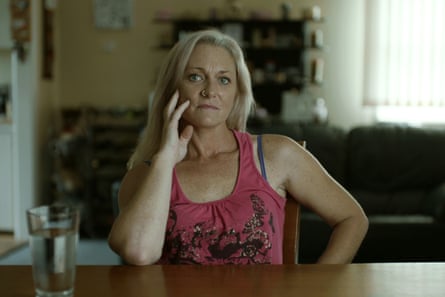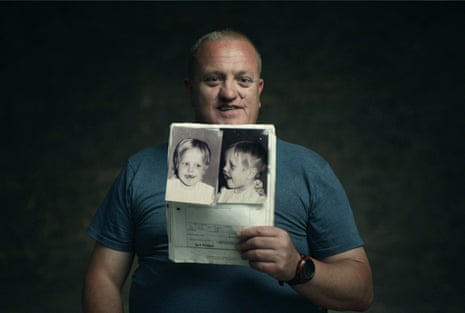The boy in the photo smiles through broken teeth. Over the years, his palate was smashed so badly that he required an emergency blood transfusion. His cheek was so scarred that kids at school called him Frankenstein. He suffered countless head injuries.
The explanations logged in the hospital notes say Jason King was a clumsy child and way too curious about blunt objects. The case file from social workers flags a more desperate tale. But because Jason’s family stayed on the move – so much so that within one 18-month period he went to six different schools – it was difficult for authorities to keep track of the little blond boy.
Imagine your childhood blanked out by amnesia. That’s the reality for Jason, now 47 and the star of a new documentary, Ghosthunter, which lives up to its name on multiple levels. When independent filmmaker Ben Lawrence first contacted him, Jason was a security guard in Sydney’s western suburbs. He’s burly, but with a slight lisp from the smashed palate. And there’s the pure, childlike joy he takes in his side job: being a paranormal investigator.
Despite living on the breadline, Jason doesn’t charge for his ghostbusting service; saving the day is feel-good enough. He’d had the idea when he kept seeing the ghost of his older brother Peter, a taxi driver who died in a collision. Jason checked out some ghost tours, then settled on a kind of ghost hunting outreach service that makes home visits. He put decals on his car, made up T-shirts for his small crew and tooled up with cameras and meters.
Lawrence’s initial contact with the genial ghost hunter revealed an interesting potential angle. Peter, who was adopted out of the family, had tracked Jason down when the latter turned 18 and become the one positive role model in Jason’s life. “I thought I would be telling a story about grief,” Lawrence tells Guardian Australia.

The loss of Peter was unfathomable. Jason’s memories of his father were shadowy. His sister had been removed from the family, and his relationship with his mother was poor – her sole contribution to the film is to write Lawrence a letter. “Go get fucked,” the director reads out loud, in a grimly humorous scene.
But the stakes were raised when Jason showed Lawrence his horrific medical records. Surely the more interesting film, Lawrence surmised, would be to piece together Jason’s childhood by finding his father. Jason readily agreed; Lawrence was the first person to whom he’d felt comfortable opening up. Usually he’d tell people he’d had a bad life and leave it at that. “A few times I rang up and tried to get help; agencies and a few doctors, psychiatrists,” Jason says. “They’d just go, well you need $220. I don’t have that kind of money. I was also worried about people judging and I just thought that I was in the too-hard basket.”
Concerned about how to proceed, Lawrence sought advice from the Blue Knot Foundation, which supports adults affected by childhood trauma. “The mechanism of traumatic amnesia is one of dissociation,” says president Dr Cathy Kezelman AM. “A lot of people don’t remember big parts of things that have happened to them. Jason has fragments but he doesn’t have much coherence or a chronology.”
In Ghosthunter, Jason wanders through the dilapidated housing estates he grew up in, gazing at the walls for answers. On one stairwell, some kids have scrawled their names for posterity.
One of those children is Cathy Quinlan. She texted Jason halfway through filming, asking if he remembered her. He didn’t. She sent him photos of gaggles of kids in backyards, with Jason beaming among them. When they established a rapport, she revealed her real reason for contacting him – that, like him, she was looking for his father. Jack King had sexually abused her, and the others. Now Jason bore an extra burden: the sins of the father.

If Ghosthunter had been commissioned by a production company – with the deadlines that entails – it would never have unfolded in the fortuitous way it did, over seven years. “While I don’t believe in ghosts,” Lawrence says, “I feel there was something we were agitating in the universe, that these people were going through similar phases in their lives. They collided at the point that I happened to be telling Jason’s story.”
When Jack King is tracked down and prosecuted, Jason turns up to court with Quinlan – who he comes to regard as a sister – and the other victims. “I wanted to show them that I was there for them, not for him,” he says now.
But it starts to seem increasingly odd that Jason could keep his positive persona throughout these incredible stresses. He’s hammered from all sides with bad fortune, captured in claustrophobic scenes set around Sydney’s west. One relationship after another disintegrates. A fire rips through the house he lives in, and he’s forced to sleep in his car. Twice, he is unreachable and it emerges he’s attempted suicide. Finally, his sister Linda calls Lawrence and lays it to him straight – Jason is not the man he seems. And then the story catapults to another level.
Without unveiling it here, this pivotal moment spoke acutely to Lawrence, who had previously worked on theTV series Man Up, about male suicide. It also marked the point that he had to visibly step into the film and intervene. The ensuing scenes, he says, polarise audiences.

As for Jason’s father, he was sentenced to 14 years in prison, with seven years’ non-parole. While inside, he writes a response to Jason’s plea for answers, which is brutal in its flip-flopping.
“We questioned even giving his father a voice,” says Lawrence, “but I feel like it was a breakthrough for Jason. Self-awareness is something that, when I first met Jason, was not very considered. By the end of the film there’s a softening in him. He went through so much in the time we spent together. When we completed the edit I let it sit with him for a few days, but he didn’t shy away from anything.”
Ghosthunter will have a limited national release, but its legacy will live on through the Blue Knot Foundation, which is using the film to educate students, social workers, police and those working in the criminal justice system about neglect and traumatic memory.
For Jason, there’s a sense of resolution and of emerging from the ashes. “I know I’ve changed a lot,” he says. “I just want people to see that I’m not that person that I used to be.”
By the end of the film he has a new girlfriend, Julia. “I told her all about the film when we met online and she didn’t believe me,” he says. “The day we met she pulled me aside and said, ‘I know you’re not doing this movie,’ and then we went to Penrith Panthers for dinner and she’s rocked up and saw the camera crew sitting there.”
Lawrence has since been best man at the couple’s wedding. The theme was Halloween.
Ghosthunter has a limited national release on 20 September
